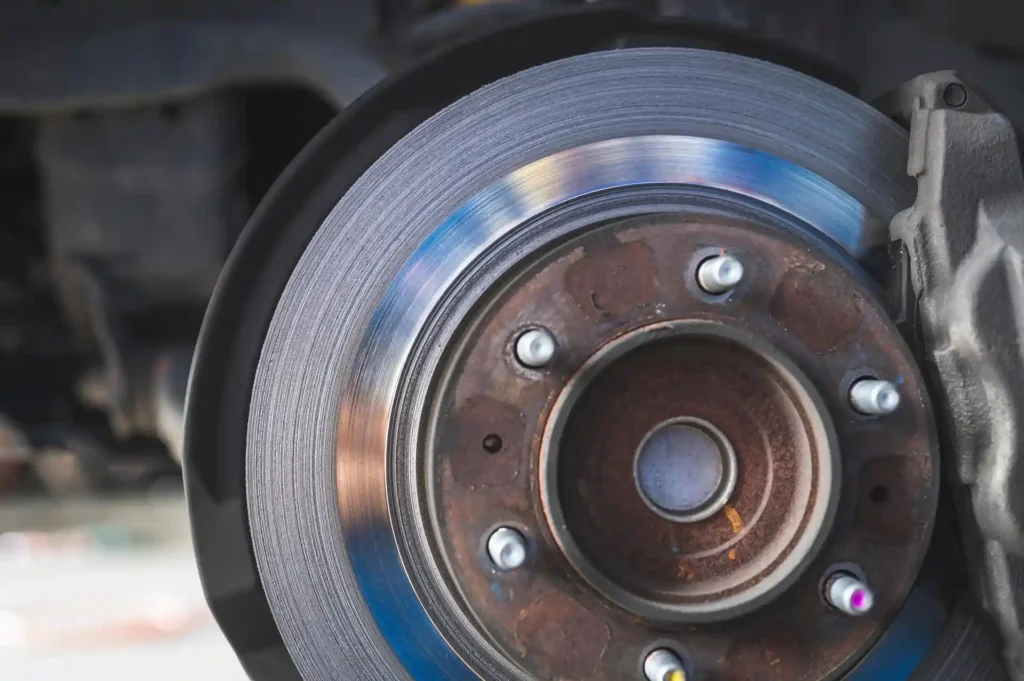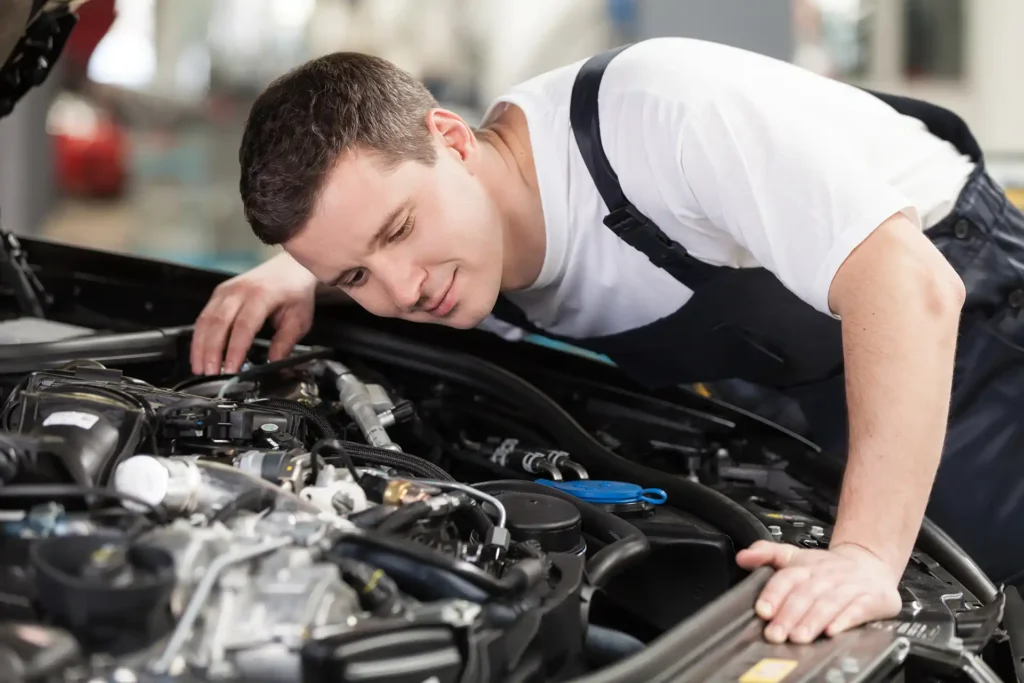Have you ever been driving along when you hear a strange sound coming from your car? Maybe it’s a high-pitched squeal, a low-pitched rumble, or a sudden clunk. These sounds are often your car’s way of telling you something is wrong. Ignoring these warning signs can lead to more serious and expensive problems down the road.
This article will help you understand 5 common car noises that require immediate attention. We’ll explain what these sounds typically mean and why it’s so important to get them checked out by a professional mechanic right away. Recognizing these noises can help you protect your vehicle and your wallet.
Table of Contents
ToggleSquealing, Squeaking, and Screeching: The Sound of Failing Brakes
Of all the noises your car can make, a loud, high-pitched squeal is one of the most common and easiest to recognize. This sound often comes from the brakes.
Why Are My Brakes Making Noise?
The most likely reason for a squealing sound is worn-out brake pads. Brake pads have a small metal piece, called a “wear indicator,” that scrapes against the rotor when the pads get too thin. This creates the squealing sound you hear. It’s a built-in alarm designed to alert you that it’s time for a brake inspection.
What Happens If I Ignore This Sound?
If you keep driving with worn brake pads, the metal of the caliper will eventually start grinding against the metal brake rotor. This grinding sound is a sign of serious damage. It can cause permanent harm to your rotors, which are much more expensive to replace than brake pads. Don’t wait for the sound to get worse.

A Low Rumble or Roar: The Exhaust System in Distress
Do you hear a deep rumbling or roaring sound, especially when you accelerate? This noise often points to a problem with your car’s exhaust system.
What’s Causing This Loud Noise?
This can be caused by a leak or a hole in your muffler or exhaust pipe. The exhaust system is designed to quiet the sound of your engine as well as direct harmful fumes away from the car. A hole allows the loud engine noise to escape before it reaches the muffler.
The Dangers of a Bad Exhaust
Besides being noisy, a damaged exhaust system can be dangerous. A leak in the exhaust can allow carbon monoxide, a colorless and odorless gas, to enter the cabin of your car. This is a serious health risk. Getting an exhaust leak fixed promptly is crucial for your safety and the health of your passengers.
Grinding Noises: A Sign of Serious Mechanical Trouble
A grinding sound is often one of the most alarming noises a car can make. This is a sound that should never be ignored, as it usually means that a major component is failing.
Grinding When You Brake
If you hear a grinding noise when you press the brake pedal, it’s a sign that your brake pads are completely worn down. The metal of the brake caliper is now scraping directly against the metal brake rotor. This is very dangerous and requires immediate attention to avoid a complete brake system failure.
Grinding When You Shift Gears
For cars with an automatic transmission, a grinding noise during gear changes could point to a serious transmission problem. In manual cars, it might mean a worn-out clutch or a bad gearbox. Transmission repairs can be very expensive, so getting this checked early can sometimes prevent a more costly rebuild.
Clicking or Tapping Sounds: A Warning from the Engine
A repetitive ticking, clicking, or tapping sound coming from your engine can be a sign of a few different issues, all of which need to be addressed.
The Most Common Causes
- Low Engine Oil: A ticking noise that speeds up with the engine can be caused by a lack of proper lubrication. Your engine parts need oil to move smoothly. Without it, they grind against each other, causing a ticking sound and serious wear.
- Worn-Out Spark Plugs: Spark plugs are vital for your engine’s performance. If they are old or not working correctly, they can cause a tapping sound.
- Valve Train Issues: A more serious cause could be a problem with the valves in your engine. This can lead to decreased performance and eventually, complete engine failure if not repaired.
Why You Can’t Wait
A ticking engine is a sign that parts are rubbing together when they shouldn’t be. This friction creates heat and wears down components, leading to potential engine damage. Checking your oil level is a great first step, but if the noise continues, a professional diagnosis is necessary to prevent a total breakdown.
A Hissing Sound: A Leak Under the Hood
A hissing or sizzling sound, especially when the engine is running or after you’ve turned it off, is a clear sign of a leak. This sound happens when fluid is dripping onto a hot part of the engine.
What’s Leaking?
The most common fluids to cause this noise are:
- Coolant (Antifreeze): A leak in the cooling system is a frequent cause of hissing. If you see a green, red, or yellow liquid on the ground under your car, you likely have a coolant leak.
- Engine Oil: Oil leaking onto a hot engine component will also create a hissing sound and a burning smell.
- Transmission Fluid: A leak in the transmission system is another possibility, which can also be accompanied by a burning smell.
The Importance of a Quick Fix
Leaks, no matter how small, can lead to bigger problems. A coolant leak can cause your engine to overheat, which can result in a cracked engine block or a blown head gasket, repairs that can cost thousands of dollars. An oil or transmission fluid leak can also lead to catastrophic damage to these major systems.
What to Do When Your Car Makes a Strange Noise
When you hear any of these 5 common car noises that require immediate attention, the best thing to do is pull over safely and turn off your car. Continuing to drive can turn a minor repair into a major, expensive one.
It’s tempting to try to fix the problem yourself, but many of these issues require specialized tools and expertise. A professional mechanic can quickly diagnose the problem and provide the correct solution.
For reliable auto repair and collision services, you can trust a company like Crown Auto Repair & Collision. Their team of certified technicians can help you with everything from brake repairs and engine diagnostics to more complex transmission issues. Don’t let a strange noise become a serious problem.
Conclusion: Listen to Your Vehicle
Your car is a complex machine, and the sounds it makes are vital clues about its health. Ignoring noises like squealing brakes, a loud exhaust rumble, or a grinding sound can lead to a breakdown and a much larger repair bill. By listening to your vehicle and acting quickly, you can keep your car running safely and smoothly.
If you’ve heard any of these noises, don’t wait. Schedule an appointment with a trusted auto repair shop today to get your vehicle checked and ensure your peace of mind on the road.
Frequently Asked Questions (FAQs)
Q1: How can I tell the difference between a minor noise and a serious one?
A: While some minor noises, like a light squeak on a cold morning, might go away, any persistent or loud noise that you haven’t heard before should be taken seriously. Noises like grinding, knocking, or a sudden, loud roar are almost always signs of a problem that needs a professional inspection. The key is to pay attention to new sounds that don’t disappear.
Q2: Can I still drive my car if it’s making a strange noise?
A: It is generally not recommended to drive your car if it’s making one of these serious noises. For example, driving with grinding brakes is extremely dangerous. Continuing to drive can cause further damage to the car’s systems and put you and others at risk. It’s best to pull over and have your car towed to an auto repair shop.
Q3: How much will it cost to fix these car noises?
A: The cost depends entirely on the cause of the noise. A simple repair like replacing worn brake pads can be relatively inexpensive, while a transmission rebuild or an engine repair can be very costly. That’s why acting early is so important—catching a problem in its early stages can save you a significant amount of money in the long run.
Hello, I’m Muhammad Awais, a Strategic SEO Specialist at Genius Agency.
My core mission is simple: to help client websites grow significantly and achieve genuine business success. I manage the full SEO process, which includes fixing technical problems, perfecting on-page content, and running high-quality link campaigns.
I enjoy solving tough ranking challenges. I use data from Google Analytics 4 and Search Console to ensure every strategy I build is based on facts and delivers solid, lasting results. My focus is on making your site a clear winner in search results.
